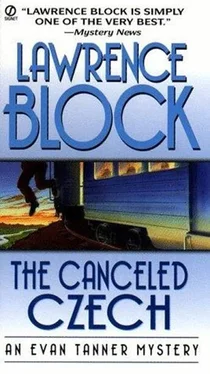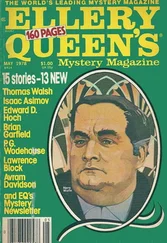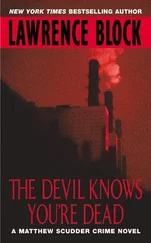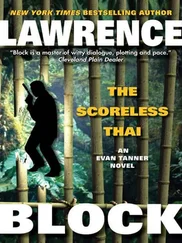“I imagine you did.”
“A great deal of practice. Some of us, however, did not leave then. Ferenc feels that those who left were cowards. Or felt that way in the past. He was only a boy then, but enough of a man to destroy two tanks. And to join in our vow not to leave the country. Were you here then?”
“No.”
“Your name is not Hungarian. You are American?”
“Yes.”
“For an American to escape into Hungary is rather the reverse of the usual course of events. It is more commonly the other way around. You do not happen to live in New Jersey, do you? I have a family there.”
“I’m from New York. It’s close to New Jersey, of course.”
“They send us packages. Food and clothing.” He smiled. “If I give you their names, could you speak with them when you return to America? There are things one does not put in a letter. You could tell them that we have no great need of food and clothing. You could tell them to send guns.”
Ferenc Mihalyi had an apartment in the old section of Budapest. He and his wife and two children lived in three rooms on the fourth floor of a drab red brick building nestled among several other buildings, also of red brick, also drab. Tanya Mihalyi was slender and birdlike, with light brown hair and constantly amused eyes. No one my age had ever called her Mama before, she told me. If she liked it, Ferenc assured her, he would call her nothing but Mama in the future.
We ate chicken paprikash on beds of light egg noodles. Kotacek was laid out neatly on the Mihalyis’ double bed. They found it difficult to believe he was really alive, but I belabored the point until they accepted it. I didn’t want him emerging magically from his trance and scaring my hosts into heart attacks of their own. Greta had only fainted, but the girl had an exceptional constitution.
After dinner we sat drinking Tokay. It was around midnight. Ferenc wanted to know if I felt up to traveling some more. “Lajos will provide his car, and I will take you to the Yugoslav border if you wish. Or if you are tired we can wait until morning. Perhaps it would be best to wait until your friend is awake.”
“It doesn’t matter. I’m not tired, and he can travel as is, if you prefer.”
“Perhaps it would be best to go now.”
“Fine.”
“Because,” he explained, “it might not be safe for you to stay here for very long. And it is still much safer to travel by night than by day. I will drive you directly south along the banks of the Duna. It should not take us more than two hours. Lajos has a very fast car. It does not look so fast, but his son is a mechanic and has worked wonders with the engine. We shall leave” – he hefted his glass – “when we reach the end of the bottle.”
We killed the bottle. Ferenc left the apartment, walked the few blocks to Lajos’ house, and returned with the car that had brought us from the border. Together we carried Kotacek down three flights of stairs and loaded him into the back seat. The car was Russian-made and resembled the General Motors cars of around 1952. Lajos, I was told, had a good position in the Ministry of Transportation and Communication. His political sympathies and his activities in 1956 were not a matter of record.
The night was cool, the moon nearly full in the cloudless sky. Ferenc was an uneven driver, making up in sheer determination what he lacked in natural ability. He aimed the car instead of steering it, and he was more a tactician than a strategist; he would hurl us into hairpin curves with no prior planning, then figure out a way to keep us on the road. I was a while getting used to this, but eventually decided that there was nothing too precarious in what he was doing. It only seemed that way.
“The border will be nothing,” he said. “There is a place in eastern Serbia near the Rumanian border. The guards there are all friends. There is a break in the fence; you can walk directly through. Will he be awake by then?”
“Perhaps.”
“An odd sickness. It is hard to believe that he is not really dead. Suppose, in one of these fits of his, that he really died. How would you know?”
“I wouldn’t.”
“Perhaps he is dead at this moment, and we neither of us know it. Perhaps you will carry him all the way back to – where is it that you are taking him?”
“ Greece.”
“Perhaps you will take him all the way to Greece only to find that he has been dead all along. A joke on you, eh?”
It was a horrible joke. I changed the subject and we talked about some mutual friends, members of some of the Hungarian refugee organizations I belonged to in New York. This one had married an American girl, that one had finally won the right to practice medicine, another was homesick and talked constantly of returning to Budapest. We talked, and I tried not to consider the possibility that I had managed to kill Kotacek somewhere along the line, and that I wouldn’t know for sure until his flesh started to putrefy. I could have done it in the car crash, of course. Perhaps the shock stopped his heart forever. Could a man have a coronary in the midst of a cataleptic fit? I had no idea.
But eventually, after about an hour in the car, Kotacek solved the problem for me. He woke up.
He was hungry and ill-tempered and had to relieve himself. Ferenc stopped the car and we let him out, and he staggered over to the side of the road and did what he had to do. Then he came back to the car and got into the back seat again. Everything ached, he told me. He was hungry, his head ached, his back was bothering him, and where on earth were we? I told him we were in Hungary, heading south.
Hungary! He was delighted. He had met Admiral Horthy and overflowed with admiration for the Hungarian fascist leader. The Hungarians had been staunch allies during the war, he told me. Good men and true. Of course there were strong partisan movements, vicious bands of Resistance fighters, but that was no doubt due to the long domination of Jews over the Hungarian peasants. Still, he remembered a time…
I gave him a shot of insulin, then fed him some sandwiches we had brought along in a brown paper bag. There was wine as well but I did not give him any. I wasn’t sure what effect it might have on his diabetes, or whether it would be good for his heart. He ate greedily, then insisted we stop again so that he could urinate once more. We did, and he did.
And, while he relieved himself, hunched over at the side of the road, Ferenc turned to me with an accusation in his eyes. “This comrade,” he said. “Who is he, Evan?”
“A Czech fugitive. An anti-Communist.”
“There are all manner of anti-Communists.”
“Yes, there are.”
“I understand Slovak. I do not speak it very well, but I can understand it. I know what the man was saying.”
“I see.”
“There were men of that sort in 1956. They would face the Russian tanks so that we might have the sort of Hungary we had under Horthy. Exchange one set of masters for another, Communists for fascists. I think I know the name of your friend. I had heard that he was dead, in Prague.”
“Perhaps this is a different man.”
“Perhaps. I do not think so.”
Kotacek returned to the car. For the first time he took notice of our driver. Who was this man? I told him he was a friend who had helped us enter Hungary and who would now help us get into Yugoslavia. A Hungarian here, Kotacek proclaimed, and began to enlarge on the role of Hungary in the foundation of the worldwide Fourth Reich. Hungarians were good healthy Aryans, he announced, and he began to trace the history of the Hungarian nation, a Magyar band who had come westward just as other tribes had come to settle in Germany, in Slovakia, in all of the pure Nordic nations. I half listened to him while I watched the expression on my friend Ferenc’s face.
Читать дальше












